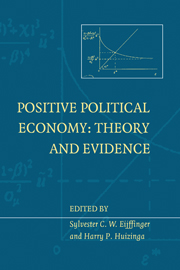Book contents
- Frontmatter
- Contents
- List of figures
- List of tables
- List of contributors
- Foreword
- Introduction
- I Monetary institutions and policy
- 1 Reputational versus institutional solutions to the time-consistency problem in monetary policy
- 2 Reciprocity and political business cycles in federal monetary unions
- 3 The ultimate determinants of central bank independence
- 4 Central bank autonomy and exchange rate regimes – their effects on monetary accommodation and activism
- 5 Uncertainty, instrument choice, and the uniqueness of Nash equilibrium: microeconomic and macroeconomic examples
- 6 New empirical evidence on the costs of European Monetary Union
- II Exchange rate policy and redistribution
- Index
5 - Uncertainty, instrument choice, and the uniqueness of Nash equilibrium: microeconomic and macroeconomic examples
from I - Monetary institutions and policy
Published online by Cambridge University Press: 05 September 2013
- Frontmatter
- Contents
- List of figures
- List of tables
- List of contributors
- Foreword
- Introduction
- I Monetary institutions and policy
- 1 Reputational versus institutional solutions to the time-consistency problem in monetary policy
- 2 Reciprocity and political business cycles in federal monetary unions
- 3 The ultimate determinants of central bank independence
- 4 Central bank autonomy and exchange rate regimes – their effects on monetary accommodation and activism
- 5 Uncertainty, instrument choice, and the uniqueness of Nash equilibrium: microeconomic and macroeconomic examples
- 6 New empirical evidence on the costs of European Monetary Union
- II Exchange rate policy and redistribution
- Index
Summary
Introduction
This chapter contains two examples of static, symmetric, positive-sum games with two strategic players and a play by nature: (1) a microeconomic game between duopolists with joint costs facing uncertain demands for differentiated goods and (2) a macroeconomic game between two countries with inflation-bias preferences confronting uncertain demands for money. In both games, each player can choose either of two variables as an instrument. In our terminology, both are linear-reaction-function games because reaction functions are linear in the chosen instruments.
More than a century ago, it was discovered that there are both Cournot (1838) and Bertrand (1883) equilibria for duopoly games with no uncertainty. There are many examples of multiple (Nash) equilibria in linear-reaction-function games with no uncertainty. In the standard differentiated duopoly game with linear demands and independent, quadratic costs, there are four equilibria if each duopolist can choose either price or quantity as an instrument. That is, there are as many equilibria as there are possible pairs of instrument choices. Likewise, in two-player macroeconomic games with quadratic utilities and linear economies there are as many equilibria as there are possible pairs of instrument choices.
The explanation of the existence of multiple equilibria in linear-reaction-function games with no uncertainty is the same as the explanation of a familiar result. Poole (1970) and Weitzman (1974) show that with no uncertainty a single controller is indifferent among instruments. Likewise, with no uncertainty if one player chooses his instrument and sets a value for it, the other is indifferent among instruments.
- Type
- Chapter
- Information
- Positive Political EconomyTheory and Evidence, pp. 120 - 153Publisher: Cambridge University PressPrint publication year: 1998



